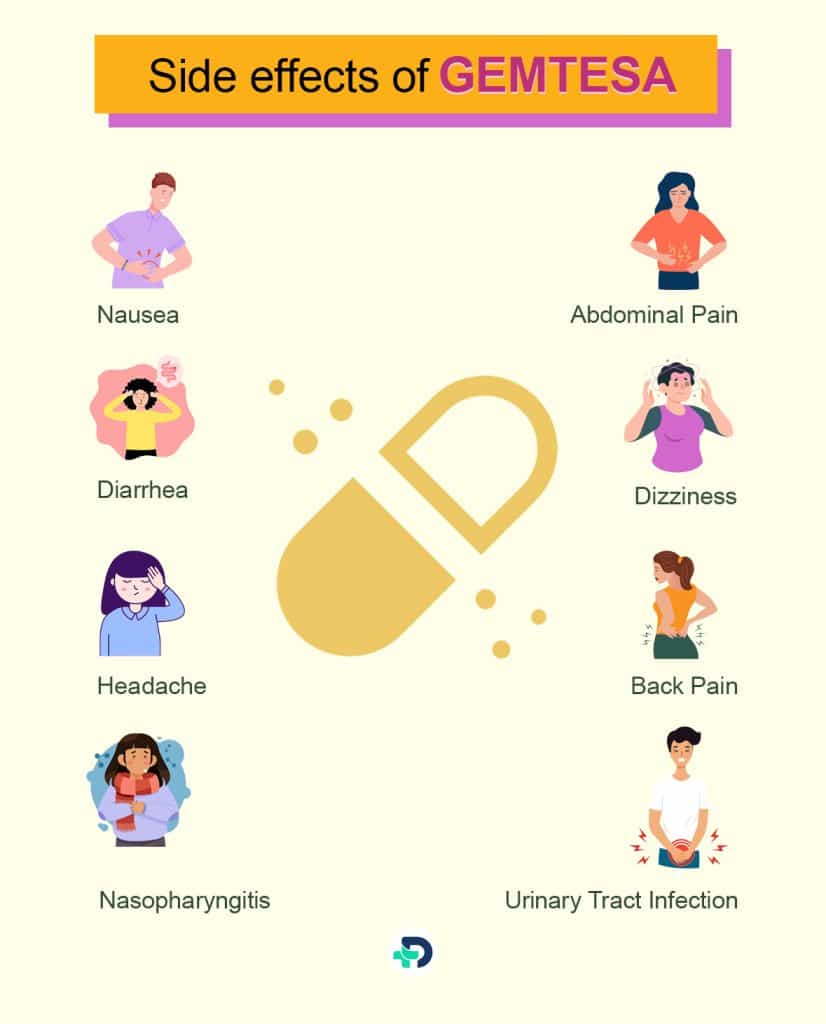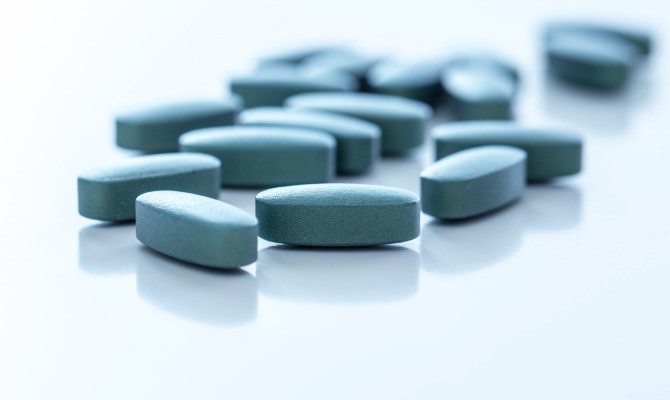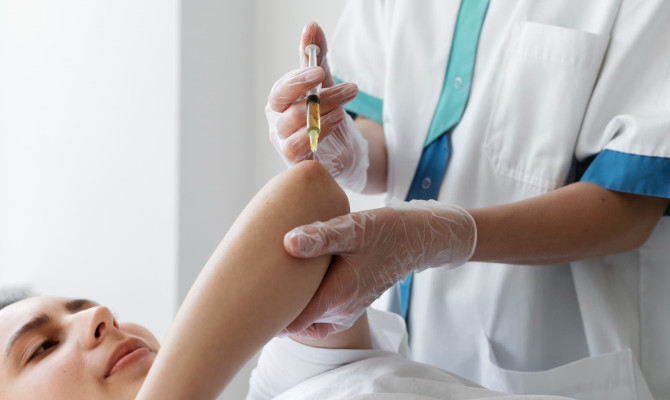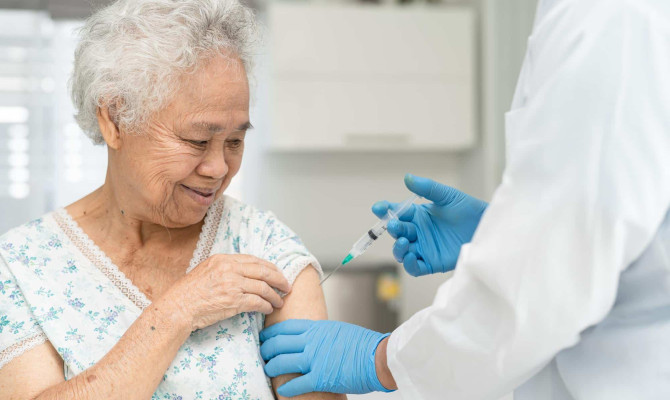Gemtesa: Uses, Side Effects and Precautions

- Gemtesa
- 22 Aug 2023
Overview
About Gemtesa
Vibegron is sold under the trade name Gemtesa. Adults with hyperactive bladders may use the prescription medication Vibegron. Urinary incontinence is frequently present, along with the acute, frequent urge to urinate that characterizes this illness.
In this article, we will go through the introduction of this medicine, its clinical efficacy, and potential benefits for OAB patients. Patients and healthcare professionals may make educated decisions about managing the condition and enhancing the quality of life for individuals afflicted by it by understanding its place in the treatment landscape.

Uses
Gemtesa uses
Adults with overactive bladders (OAB) are its primary target market. Gemtesa aids in reducing its symptoms and enhances bladder control.
Here are the critical uses:
Overactive bladder (OAB)
- It reduces frequent urination
- Lessens the need to urinate urgently
- Reduces urine incontinence episodes.
- It improves the quality of life by relaxing the bladder muscle by enabling better control over bladder function.
It’s important to remember that this medication requires a prescription and should only be used as directed by a medical expert. The dosage and duration may change depending on the individual’s needs and how the drug responds.2Uses| Researched based study from Nlm.nih.gov
Side effects

Gemtesa side effects
Although it is a generally well-tolerated medication, adverse effects are always a possibility. These may impact people differently and can range in severity. It’s important to keep in mind that not everyone will encounter these, and some people might not have any at all.
Here are some examples of both the mild and severe side effects.
Mild side effects
- Nausea
- Diarrhea
- Headache
- Dizziness
- Abdominal pain
- Nasopharyngitis (common cold symptoms)
- Urinary tract infection (UTI)
- Back pain
- Increased blood pressure
Severe side effects (rare)
- Allergic reactions include hives, rash, swelling, or breathing issues.
- Severe fainting or dizziness
- Irregular or fast heartbeat
- Extreme bloating or discomfort in the abdomen
- Severe urinary retention (bladder retention)
If you have any undesirable side effects that are significant or worrisome, it is imperative that you seek medical attention. Your medical professional can evaluate the symptoms and choose the best line of action.1Side effects| Researched based study from Fda.gov
Dosage
Gemtesa dosage recommendations
The dosage may change based on unique circumstances and the particular advice of your healthcare expert. It’s important to follow your doctor’s recommendations for dosage and other precautions. The dosage recommendations that follow are general and may not apply to everyone.
First dosage
- 75 mg once daily is often the initial dose.
Maintenance dose
- Your dose may need to be changed after evaluating your tolerance and reaction to the initial amount.
- The standard maintenance dose is 75 mg once daily.
Dosage changes may be required for those with particular medical conditions or taking specific drugs.
Always take it precisely as directed, ideally on a leisurely day simultaneously, with or without food. Never take more than what is recommended.1Dosage| Researched based study from Fda.gov
What occurs if a dose is missed?
- If you need to remember to take a dose, do so right away, unless your next dose is about to be due. Skip the missing dose in that case, and then return to your regular dosing plan.
Precautions
Warning and precautions
Before using the drug, knowing the dangers and precautions related to gemtesa is critical. You can use this information to guarantee safe and efficient use and to make informed decisions. Here are some general cautions and warnings to take into account:
Allergic responses
- Some people might go through this. Before beginning therapy, let your doctor know if you have a known allergy to vibegron or any other medicine component.
Urinary incontinence
- Particularly in those with bladder outlet obstruction or at risk of getting it, it may raise the risk of urine retention. Before beginning the medication, discussing any current bladder or urinary issues with your doctor is crucial.
High blood pressure
- It has a history of making blood pressure go up. During treatment, your blood pressure should be checked often if you have an account of high blood pressure or cardiovascular diseases.
Kidney or liver disease
- People who use it may need dosage changes or special monitoring if they have moderate to severe renal or liver damage. If you experience any liver or renal problems, tell your doctor.
Breastfeeding and getting pregnant
- It is unknown whether it is safe to use during pregnancy and breastfeeding. Talk to your healthcare practitioner about the potential dangers and advantages of the medication if you are breastfeeding or planning a pregnancy.
Pediatric use
- Its usage in pediatric patients is not advised because the drug’s effectiveness and safety have not been shown in users under 18.1Precautions| Researched based study from Fda.gov
Alternatives
Gemtesa alternatives
If Gemtesa is unsuitable for you or you’re seeking an alternate drug to treat OAB, there are several possibilities.
Anticholinergic drugs
- A neurotransmitter called acetylcholine, which is involved in the contraction of the bladder muscle is what the medications oxybutynin, tolterodine, and solifenacin inhibit. Urinary urgency and frequency are lessened as a result.
Mirabegron
- Another medication has been approved for the therapy. Calming down the bladder muscle temporarily paralyzes it and lessens contractions.
Pelvic floor muscle exercises (kegel exercises)
- These exercises improve bladder control and minimise OAB symptoms by contracting and relaxing the pelvic floor muscles.
Alterations in lifestyle
- Making some lifestyle adjustments, such as staying away from bladder irritants like caffeine and alcohol, maintaining a healthy weight, timing your bathroom visits, and using bladder training techniques, may be helpful.3Alternatives| Researched based study from Nlm.nih.gov
Interactions
Drug interactions
Strong CYP2D6 inhibitors
- The CYP2D6 enzyme metabolizes it predominantly. Gemtesa exposure may be raised when used with potent CYP2D6 inhibitors like paroxetine or fluoxetine. Your doctor may need to change the dosage or try a different medication.
Potent CYP3A4 inducers
- It serves as CYP3A4’s substrate. Drug exposure may be reduced when used concurrently with strong CYP3A4 inducers like rifampin or carbamazepine. Your doctor might need to try a new drug or adjust the dosage.1Interactions| Researched based study from Fda.gov
These are not the only possible drug interactions; there may also be interactions between prescription, over-the-counter, and herbal products. To ensure a thorough assessment of potential interactions, always tell your healthcare provider about all your medicines, including supplements and herbal remedies.
Bottom line
The bottom line
The ground-breaking drug gives overactive bladder (OAB) sufferers hope. Calming the bladder muscles lessens the frequency and severity of episodes of urine urgency and incontinence.
Even though it is typically tolerated well, it is crucial to be aware of any potential adverse effects, both minor and severe.
Before utilizing, discussing any current medical issues, allergies, or prescription drugs is crucial. If it is suitable for your specific situation, they can decide whether to adjust the dosage.
Any feedback on this article?
 This Articles content was accurate
This Articles content was accurate Very Informative Article
Very Informative Article I have a question or a comment
I have a question or a comment
 This article contains inaccurate content
This article contains inaccurate content This article was not helpful
This article was not helpful I have a question or a comment
I have a question or a comment
We appreciate your helpful feedback!
Checkout our social pages
References
-
FOOD AND DRUG ADMINISTRATION
GEMTESA (vibegron) tablets, for oral use | Dosage | Side effects | Interactions | Precautions
-
National Library of Medicine
An Evaluation of the Efficacy and Safety of Vibegron in the Treatment of Overactive Bladder | Uses
-
National Library of Medicine
Which drugs are best for overactive bladder? From patients’ expectations to physicians’ decisions | Alternatives



































